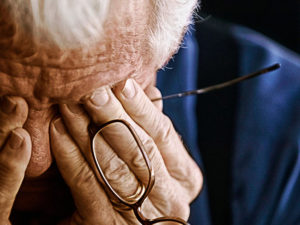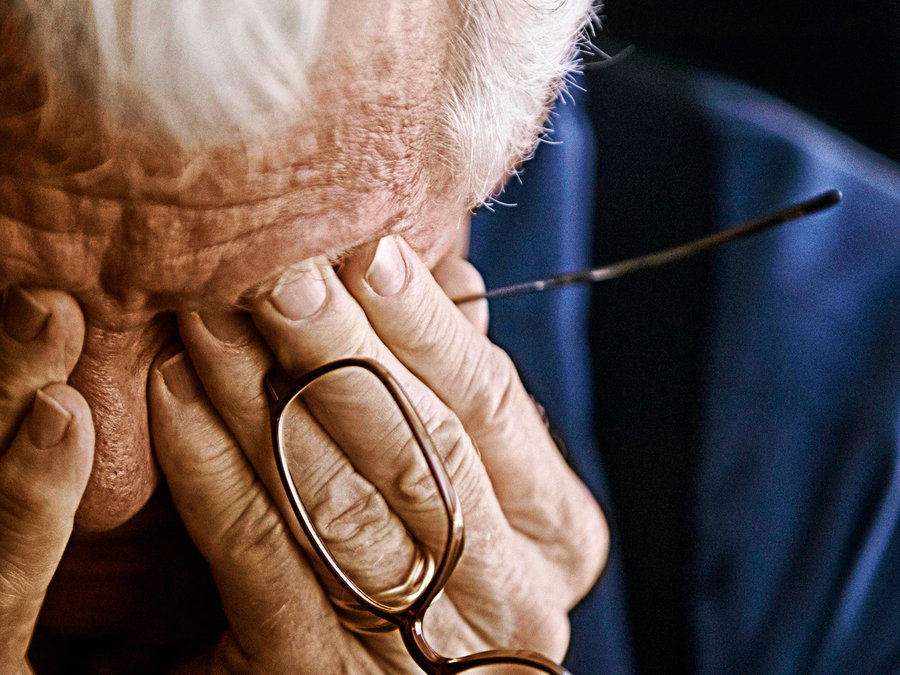
In a Lighthouse five-year research study, which focused on those adjusting to age-related vision loss, we looked at the relationships among vision loss, depression and vision rehabilitation. In particular, the study examined the effect of depression on service use, and the impact of vision rehabilitation on functional ability and emotional well-being.
What Is Depression?
Depression can feel overwhelming but it should not be ignored, accepted or expected to go away on its own. It’s a treatable medical condition. Know the signs and take them seriously. If you or someone you know experiences five or more of the symptoms listed below (including at least one of the first two) over at least a two-week period for most of the day, almost every day, seek help: depressed mood; loss of interest or pleasure in things usually enjoyed; decreased/increased appetite or weight gain or loss; sleep disturbances (trouble falling asleep, staying asleep, waking early, sleeping too much); feeling fidgety or restless; unable to sit still; fatigue or loss of energy; feelings of worthlessness or excessive/inappropriate guilt; diminished ability to think or indecisiveness; and thoughts of death or suicide. A medical or mental health professional can diagnose major depression and rule out other health issues.
Also, people who experience at least two but less than five of the symptoms (including one of the first two) for two weeks or longer, are likely to have “minor depression,” also known as subthreshold or subclinical depression. This is actually more common than major depression in both the general older adult population and among people with vision impairment.
Subthreshold depression also can have a significant negative effect on functioning and life quality. Vision Loss and Depression In our sample of older adults seeking vision rehabilitation, the Lighthouse study showed that 7% had major depression and 27% had subthreshold depression.1 These rates are much higher when compared to older people in general. Whether a person with vision loss becomes depressed seems more related to the impact the vision loss has on a person’s functioning rather than to the actual severity of vision loss. And that impact can be devastating, as illustrated by the following comments:
“At night when my husband’s asleep, I’m very depressed and I cry.”
“Nearly every day I’m sad. Can’t let my wife know.”
“… feel like everything is falling out the bottom of things. All I want to do is go to bed and sleep.”
“I stopped driving to visit people. Now they must visit me. I stopped living… wish life would end.”
Our research showed that people who are most at risk for depression are those who report poorer overall health, less adequate help from their family and friends, decreased feelings of their own effectiveness, and a past history of depression.
Impact of Depression on Service
Use This study showed that adults with age-related vision loss who applied for vision rehabilitation services, and who also had a diagnosis of major depression, were 64% less likely than those without such a diagnosis to actually use any rehabilitation services. Also, looking only at those who did use some vision rehabilitation services, a major depression diagnosis predicted fewer hours of service. It appears that people with vision loss who also experience major depression may find it too difficult to take advantage of services. And it may be that people need to address depression first if rehabilitation is to be successful.
One study participant who did not receive services commented, “I certainly don’t want to talk about my eyesight or have anyone else talk about it either. It would be very depressing. Maybe I haven’t reached that stage where I am that desperate.”
Unfortunately, not getting services is all too common. Yet, experience and research demonstrate that learning skills to compensate for vision loss can have a positive effect on one’s emotional well-being and overall quality of life.
Benefits of Vision Rehabilitation
Lighthouse research has demonstrated the positive effects of vision rehabilitation services on the adjustment of people with age-related vision impairments. Most study participants received clinical low vision services, which involve the assessment of remaining vision and the prescription of optical devices by specially trained eye doctors. These devices help people maximize use of residual vision and include various types of magnifiers, telescopes and special sun-wear. We found that people who used a greater number of these devices showed decreases in both their functional disability and depressive symptoms over a six-month period. The use of optical devices seems to have had a positive effect because they enabled people to continue to accomplish tasks visually.
“Prism glasses are very important to me. I use them to do my reading and my crossword puzzles. I have them enlarged from The New York Times. It does my heart good to be able to work the puzzles.”
“My optical aids are very important to me. I cannot conduct my life without them.”
Other vision rehabilitation services include orientation & mobility training, vision rehabilitation therapy and counseling. Our study showed that people who used more hours of rehabilitation (across all service types) were better able to carry out everyday tasks.
“Do my reading during the day when I have the sunshine. I’ll listen to radio and TV in the evening when it’s harder to read. I try to plan things with other people more because of the difficulty of doing them alone.” “I still cook and bake in the kitchen. Write myself a shopping list with the black marker.”
These more positive outcomes were also associated with a decrease in depressive symptoms over time.
What can you do if you or someone you know is feeling depressed or down? Seek help from a medical or mental health professional. Don’t ignore symptoms or expect them to go away on their own. Depression is a treatable medical condition. According to the National Institute of Mental Health, more than 80% of all people with depression can be successfully treated with medication, psychotherapy or a combination of both. And, if you or someone close to you feels overwhelmed by vision loss and its impact on life, check out vision rehabilitation services and support groups in your area.
References 1 Horowitz, A., Reinhardt, J.P., & Kennedy, G. (2005). Major and subthreshold depression among older adults seeking vision rehabilitation services. American Journal of Geriatric Psychiatry, 13, 180-187. 2 Horowitz, A., Brennan, M., Reinhardt, J.P., & MacMillan, T. (2006). The impact of assistive device use on disability and depression among older adults with age-related vision impairments. Journal of Gerontology: Social Sciences, 61B (5), S274-S280.
